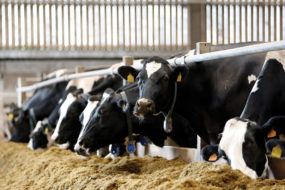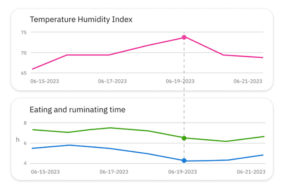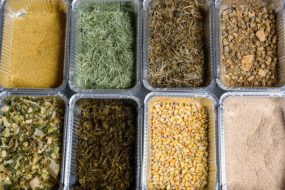Organic milk requires organic cows, which require organic hay and months of pasture time. California's drought has organic farmers searching for organic feed, desperate to keep their organic status.
USDA regulations require 120 days per year of grazing on pasture for a cow to be certified organic. California has been granted an exception that reduces the requirement to 90 days, according to the Los Angeles Times, but farmers can't graze on fields that aren't there.
Leased pasture in California's Central Valley is rapidly being converted to almond orchards, according to Grist. Pasture leases for $2,000 per acre, but landowners can get $25,000 per acre for almond orchards. Dairymen are being priced out of the land they need for grazing, even as they need more.
"Right now, there's zero pasture," Petaluma-based organic dairy producer Albert Strauss told Scientific American in February. This October, he told the LA Times the same thing: "We have no irrigation and our reservoirs are dry." Strauss can't keep his pasture green without water, something California sorely lacks.
The entire state of California is in a state of "moderate drought" or worse, according to the U.S. Drought Monitor, and more than 50 percent of the state is in "exceptional drought," worse than "extreme." Drought Monitor defines exceptional drought as "exceptional and widespread crop/pasture losses; shortages of water in reservoirs, streams and wells creating water emergencies."
In Fresno County in southern California, farmers are paying $800 to $1,100 for an acre-foot of water, according to the Los Angeles Times. In neighboring Tulare County, they pay $1,200 to $1,800. Both counties are in a state of exceptional drought. Last year, they could buy an acre-foot for $140.
The dairy that Strauss owns, Strauss Family Creamery, works with six other organic dairies. All are hurting because of water shortages leading to high organic feed prices. "I am not sure how we will go another year beyond this," Strauss said.
Some of his neighbors have shut down, or switched their organic cows to conventional milk production. Non-organic feed is cheaper, even if it means that the milk is not qualified as organic.
The farmers' difficulties are seen on retail shelves. A CBS San Francisco report from Petaluma showed bare shelves in area supermarkets. One grocery store had a sign attributing the shortage to a nationwide increase in demand. With low water and feed supplies, the store expects the organic milk shortage to continue through December. PD
—Summarized by Progressive Dairyman staff from cited sources
GRAPHIC
More than 80 percent of California is in a state of "extreme drought" and more than 50 percent is in "exceptional drought" in this U.S. Drought Monitor map of California. Click here for the latest update on drought conditions or here for a larger version of the above image (PDF, 440 KB).






